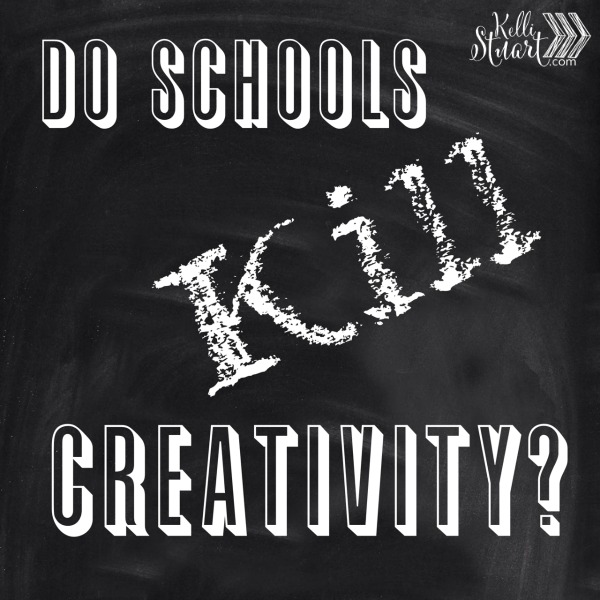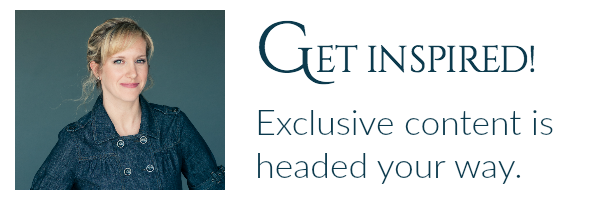One of the great joys of my job as a writer is the opportunity I have to connect with other writers and creative thinkers. Social media has made this ability to connect nearly seamless, and I find myself grateful and in awe of the people I can interact with on a day to day basis online. Some of those people I’ve even had the privilege to meet in person, and I can now call them friend.
And I have talented friends.
This week I’ve been reading Tsh Oxenreider’s book, Notes From a Blue Bike: The Art of Living Intentionally in a Chaotic World. The book is great, and has given me plenty of pause to stop and think about how to live this life with intention and purpose in a world that sometimes feels like it’s propelling you forward full speed ahead.
In her chapters on education, Tsh points readers to a TED talk by Sir Ken Robinson. This particular TED talk has been seen over 26,000,000 times, and after watching the 18 minute video, I can understand why. He’s funny, engaging, amiable, and he makes a heck of a lot of sense.
The title of the talk is How Schools Kill Creativity.
It sounds like it would be a terrible public school rant, doesn’t it? Indeed, it’s not. Sir Ken is not out to bash the public school system, so much as to discuss the need for a massive paradigm shift.
I was so enthralled by Robinson’s assertions in this video, that I went on to watch all of his talks posted at TED.com, and each one of them bore the same central message:
Education must feed the spirit, and the energy, and the passion of each individual child so that learning can truly take place.
For some students, school really can be a magical place. The structure, the books, the sense of accomplishment and the broadening horizons of new things known feeds their souls.
And for some, school crushes the spirit.
It’s very difficult to be a parent trying to decide how to best educate her children in this day and age. On the one hand, there are so many options. We aren’t relegated to a one size fits all approach if we don’t want to be. We can choose differently for our kids.
On the other hand, there is so much information being thrown at us about what is best, how children learn, how to cultivate a love for learning, and so much of it is contradictory that we start to feel the smoke billow from our ears as information overload quickly shuts us down.
So what do we do?
I don’t have an answer for you here other than to say, I don’t think anyone can truly claim that they have found the be all, end all solution to education. There is no one right way to educate all children, because they are all different. So how do we choose? How do we guide them down this path of learning that actually gives flight to their natural bent, and speaks to their individual spirit?
I will say that it is very, very hard to do this in a public school setting. That’s not an indictment against the public school. All three of my children are currently publicly educated, and for us, for now, this is what works. But I see the gaps, and I cringe at the holes. I see the cookie cutter mentality, and the severe focus on standardized tests that have crippled our teachers, and stifled education. My job as the parent of public school children is to fill in those gaps when and how I can.
I’d love to hear your thoughts on this matter, and ask that we could do so with respect for one another’s different choices in education. Do you think that schools kill creativity? Do you see gaps in your children’s education and growth as individuals? How do you work to fill in those gaps? What are your challenges as you face the choice of where and how your children should be educated?


I agree whole heartedly that one size does not fit all. I believe strongly that as parents, we must pay attention to who our kids are, to know them and then provide them with what they need to succeed. To succeed as a whole person, not just in core subjects or academically. Great post Kelli.
I agree, Amy. My struggle comes in when I can see that my children would benefit from different types of education, but knowing they would be upset to be split up. I have one chile I would love to homeschool, one who thrives in public school, and one about whom I’m on the fence. If I homeschooled just one of them, the other two would freak out. I struggle to know what’s the best for everyone at the same time.
Without saying that school kills creativity, I will say that having my creative child at home allows his to live and breath and flourish. There is no room in the classroom you described for a child with ADD who is sensitive, artistic, and infers deep meaning from literature and Bible Stories. I think he’s rather special, but his teachers weary of him quickly. My creative child feel out of place and lost amidst the pace at school. But at home he reads and is asked to write what he thinks. We edit, find a song for him to learn that reinforces a theme or character trait. We get out the water colors and talk about similes and don’t worry about the MAPS scores or his old teachers frustration with him. I’m not perfect, I get frustrated that math facts get lost and wrong pages in his history book are read, but when I step back I see clearly how right the fit is for my boy.
Those “special” kids are the ones who suffer most. This is why public education cannot be deemed the best option for everyone, because for some it just clearly is not. You are such a great example of a mama who is pouring into her kids exactly as they need it.
I agree that public schools do not intend to kill creativity, but with a room full off kids to educate and standards to be met there is simply no room for a teacher to meet everyone’s individual needs or cater to their passions. I love begin able to get the 3 R’s out of the way and then turn everyone loose to shoot Lego stop-motion videos, write and illustrate lengthy stories, or design a whole feature length production with their stuffed animals. I have seen far more authentic learning take place that way than when they were completing worksheets and taking tests so we could just mark it off a list. But on the other hand, I was one of those kids who thrived in a public school setting because I totally dig it when someone hands me an assignment, a deadline, a syllabus and a library card. I saw it as a challenge, and yes, I actually remember a LOT of the stuff I learned that way although most of it was totally useless in a normal life setting. But most of the current research shows those who learn that way make up roughly 10% of the population. Everyone else suffers a bit (or a lot) in the traditional classroom.